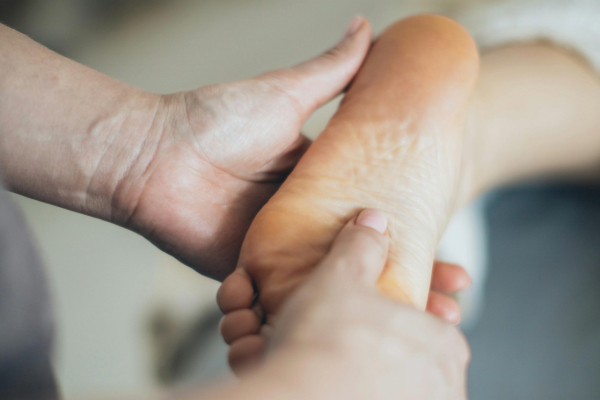Mapping Out Foot Pain: The Role of Dermatomes

Have you ever experienced strange sensations in your feet, such as numbness, tingling, or even sharp pain, and wondered where they come from? The answer may lie in a fascinating part of our nervous system, known as dermatomes.
Understanding them can help you make sense of foot pain and how it relates to the rest of your body. So, with that said, let's delve into dermatomes and discover their significance…
What Are Dermatomes?
Dermatomes are specific areas of skin that are primarily supplied by a single spinal nerve. Imagine your body as a well-organised map with different regions connected to specific nerves originating from your spine. Each of these regions is a dermatome. There are 31 pairs of spinal nerves, and each pair corresponds to a specific dermatome. These dermatomes cover the entire body, including your feet.
The Nervous System: A Quick Overview
The human body contains more than 100 billion nerve cells. These cells, or neurons, are bundled together to form larger nerves. Nerves originate in the brain and travel through the spinal column, branching out to various parts of the body, including the peripheral areas such as hands and feet. This intricate network allows for communication between the brain and different body parts, enabling sensation and movement.
Dermatomes and Foot Pain
Due to the extensive network of nerves running through our bodies, pain or discomfort in one area can often be a sign of an issue elsewhere. This is particularly true for the feet. The nerves in your feet are connected to specific dermatomes that trace back to the spinal cord. If there's a problem in the spine, it can manifest as pain or unusual sensations in the corresponding dermatome in your feet.
Typical Nerve Pain Symptoms
Nerve pain, also known as neuropathic pain, can present in various ways. Common symptoms include:
· Numbness
· Tingling
· Pins and needles sensation
· Cramping
· Sharp, shooting pain
These symptoms can be bothersome and impact your daily activities, but understanding that they might be linked to other issues can help in seeking the right treatment.
Diagnosis
Diagrams showing the distribution of dermatomes in the body, particularly in the feet, can be incredibly useful for diagnosis. By identifying the specific area of pain or abnormal sensation, healthcare professionals can trace it back to the corresponding spinal nerve. This helps in pinpointing the root cause of the problem, which could be a herniated disc, spinal stenosis, or other spinal conditions.
Understanding Nerve Conduction Issues
It’s important for us to consider various factors and conditions that may affect nerve conduction. These include spinal compression or spinal canal stenosis, nerve irritation or entrapment conditions such as Morton’s neuroma and tarsal tunnel syndrome. Alcohol dependency, a lack of Vitamin B12 and complications arising from Diabetes can also result in the nerve impulses being interrupted or failing completely. Recognising and addressing these factors is crucial in providing effective treatment for our patients.
Treatment Options
Treatment for this type of foot pain and related conditions can vary depending on the diagnosis. Some common approaches include:
· Physical therapy to strengthen supporting muscles and improve mobility
· Medication to manage pain and inflammation
· Orthotic devices to support proper foot alignment
· Manual therapy techniques to relieve pressure on nerves
· In some cases, surgical intervention may be necessary to correct underlying issues
Understanding dermatomes and their role in foot pain can provide valuable insights into your symptoms. It highlights the importance of looking beyond the obvious and considering the broader connections within your body.
If you're experiencing persistent discomfort or unusual sensations, don't hesitate to seek professional help from our podiatrists for your foot pain. Click here or call to book an appointment at our New Milton Foot Clinic.


